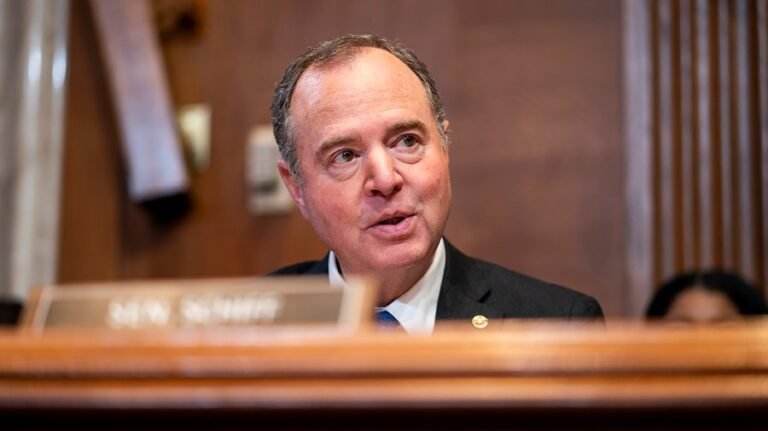
Senate Republicans are scrambling to resurrect President Trump’s “big, beautiful bill,” which stalled Thursday after Parliamentarian Elizabeth MacDonough rejected one of its biggest cost-cutting provisions.
The chamber’s referee ruled the Senate’s proposed cap on health care provider taxes violated the Byrd Rule, which governs what legislation can pass with a simple-majority and avoid a filibuster under budget reconciliation rules. The provision would cut hundreds of billions of dollars in federal Medicaid spending.
Senate Majority Leader John Thune (R-S.D.) told reporters his leadership team has “contingency plans” to keep the bill moving forward, even though the key piece may now fall out of the bill.
“We have contingency plans, plan B, plan C,” he said as he walked into a Republican lunch meeting.
Losing the Senate’s proposal to deeply cut on federal Medicaid payments means Republican leaders will need to come up with hundreds of billions in new savings to pay for the cost of making several corporate tax cuts permanent.
The surprise decision, which was announced Thursday, has Republican senators scrambling for a way to pass the legislation by the July 4 deadline set by Trump.
“We have no idea what’s going to happen here, we got to work on some kind of a fix,” said Sen. Josh Hawley (R-Mo.). “Hopefully their fix will involve protecting rural hospitals.”
Hawley was one of several GOP senators, including Sens. Susan Collins (R-Maine), Lisa Murkowski (R-Alaska), Jerry Moran (R-Kan.) and Thom Tillis (R-N.C.), who expressed strong concerns that capping health care provider taxes could push scores of rural hospitals across the country into bankruptcy.
Senate Democrats estimate that the parliamentarian had rejected approximately $250 billion spending cuts from the Republican bill, giving GOP leaders a huge task in finding new ways to offset the cost of corporate tax cuts.
Offsetting the cost of corporate tax breaks beyond the 10-year budget window is a critical element of Thune’s and Senate Finance Committee Chairman Mike Crapo’s (R-Idaho) strategy because they want to make them permanent.
“I think the monetary implications are fairly significant,” said a Senate Republican who requested anonymity to discuss the parliamentarian’s impact on the reconciliation package.
Asked how long the bombshell ruling would delay the centerpiece of Trump’s legislative agenda, Crapo quipped: “Sometime between now and next March — I’m just joking.”
Sen. John Kennedy (R-La.) said the parliamentarian’s ruling against a key spending cut in the bill is going to be a major problem for Senate conservatives unless GOP leaders can find another way to fit additional deficit-reduction measures into the bill.
“I don’t anticipate now us voting on the motion to proceed tomorrow. I think my colleagues who view the bill more as a spending reduction bill than an extend-the-tax-cuts bill are probably going to be screaming like they’re part of a prison riot because this substantially reduces savings,” he said.
“We don’t know if we can save the Medicaid portion,” he said.
He questioned whether Republican lawmakers would stay in town over the July 4 recess if there’s no certain timeline for voting on the legislation.
“I’m prepared to stay the whole week but as a practical matter a lot of people are running for an election, a lot of people have plans. One of John’s challenges is going to be … keeping people here,” he said of Thune. “People say, ‘Well, when you’re ready, call me. I’m going home.’”
Trump on Tuesday urged lawmakers to stay in Washington and skip the upcoming July 4 recess to finish the bill.
“To my friends in the Senate, lock yourself in a room if you must, don’t go home, and GET THE DEAL DONE THIS WEEK,” he posted on social media.
Sen. Ron Johnson (R-Wis.), a member of the Finance Committee, called the parliamentarian’s ruling “a big ol’ grenade” that could blow up the bill.
Johnson wants GOP leaders to go back to the drawing board and come up with alternative spending cuts.
He is proposing leaving Social Security, Medicare and Medicaid alone and focusing instead on other mandatory spending that he says has swelled the annual federal budget by more than $400 billion a year.
Crapo said his staff would try to “work it out” to keep the bill on track
“This is regular process. Now we know what the guidance was, we will react to it,” he said.
Some Republicans say the language in the provision to cap health care provider taxes, which states use to increase their shares of federal Medicaid funding, can be reworked to pass the parliamentarian’s review.
“We’re going to have to keep working on it. It’s a scam, it’s a scam the states are using to not have to put up their money for Medicaid,” Sen. Rick Scott (R-Fla.) said. “I’m focused on getting a deal done.”
Senate Budget Committee Chair Lindsey Graham (R-S.C.) announced Thursday that he’s working with Thune and Crapo“to find a pathway forward regarding the provider tax ruling from the parliamentarian.
“The provider tax is one of the biggest scams I’ve ever seen in Washington and I’m hopeful we can find a way forward that is Byrd compliant,” he said.
Hawley, who has criticized the Senate GOP plan to drastically restrict states use of health care provider taxes, said his colleagues should look at the less stringent Medicaid reforms passed last month by the House last month.
He called the House language “better.”
“The rural hospitals would like a few small tweaks to that,” he said.
He said Trump suggested in a recent conversation that Senate negotiators return to the House-passed Medicaid language.
Hawley said Trump told him Wednesday that he doesn’t want the bill to become too focused on cutting Medicaid.
“I think he wants it done but he wants it done well. He does not want this to be a Medicaid cuts bill. He made that very clear to me: this is a tax-cut bill, it’s not a Medicaid-cut bill. I think he’s tired of hearing about all of these Medicaid cuts, as am I,” Hawley. “That’s because there are too many Medicaid cuts in this bill.”






